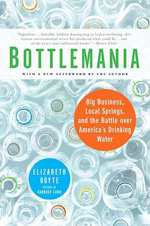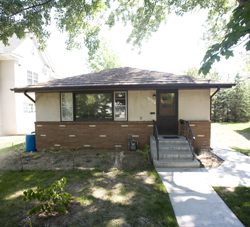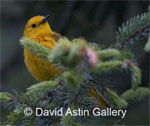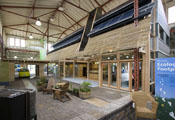EnviroThursday Spring 2011
Contact
Environmental StudiesOlin-Rice Science Center, Room 249 651-696-6274
esson@macalester.edu
instagram twitter
Presentations take place at 12 noon, Olin-Rice Room 250
February 3, 2011
“Moving Beyond Coal: The National Battle”
Speaker: Barbara Freese, Senior Policy Analyst/Advocate for the Climate and Energy Program of the Union of Concerned Scientists (UCS)
The hundreds of coal plants operating around the country are the greatest source of global warming pollution in the nation, emitting more than all our cars, trucks, buses, and trains combined. They are also the source of about 45% of the nation’s electricity. Barbara Freese will discuss the status of the fight to finally replace our aging and environmentally destructive fleet of coal plants with clean technologies, describing the many opportunities and challenges ahead.
Barbara Freese worked extensively on coal and climate policy, and has co-authored the UCS reports A Risky Proposition: The Financial Hazards of New Investments in Coal Plants (forthcoming, Feb. 2011) and Burning Coal, Burning Cash: Ranking the States that Import the Most Coal (2010), among others. She is also the author of the book, Coal: A Human History (Penguin), selected by the New York Times as a Notable Book for 2003. From 1986-1999, she was an Assistant Attorney General for the State of Minnesota where she focused on implementing state and federal air quality laws.
February 10, 2011
“Macalester’s Draft Sustainable Landscaping Plan”
Speaker: Fred Rozumalski, Barr Engineering
Fred Rozumalski will present the innovative plan that will guide Facilities Services in implementing a lower input landscape. The plan will incorporate elements, such as alternative to lawn plantings, native plants, stormwater capture and plantings to maximize energy efficiency in buildings. Come and comment on the suggested change to the face of campus.
Fred Rozumalski is a landscape ecologist with Barr Engineering, the firm undertaking the landscaping plan. He has also co-authored a book on Landscaping for Wildlife and Water Quality.
February 17, 2011 – Weyerhaeuser Chapel

“Bottlemania”
Speaker: Elizabeth Royte, author of Bottlemania
Addressing and then moving beyond the environmental consequences of making, filling, transporting and landfilling billions of plastic, single serve water bottles, Elizabeth Royte will examine the state of tap water today (you may be surprised), and the social impact of water-hungry multinationals sinking ever more pumps into tiny rural towns. Ultimately, she makes a case for protecting public water supplies, for improving our water infrastructure and, in a world of increasing drought and pollution, better allocating the precious drinkable water that remains.
Elizabeth will show how we can all make a difference by learning to recognize our oversized environmental footprint and then taking steps to shrink it — as individuals, community members and voters. As we continue to exploit and abuse the planet’s precious natural resources, she cautions that positive, regenerative change can only be possible if we honestly reassess our relationships with waste, water and our own daily routines.
A widely acclaimed writer on science, the environment and mankind’s uneasy relationship with both, Elizabeth Royte, author of Garbage Land: On the Secret Trail of Trash and Bottlemania: Big Business, Local Springs and the Battle over America’s Drinking Water, does the dirty work to get at the heart of some of the more troubling issues facing an increasingly consumptive global society. Her work has appeared in Harper’s, The New Yorker, National Geographic, Outside, The New York Times Magazine, and other national publications. A former Alicia Patterson Foundation fellow and recipient of Bard College’s John Dewey Award for Distinguished Public Service, Royte is a frequent contributor to the New York Times Book Review, a contributing editor for OnEarth, and a correspondent for Outside magazine. Her work is included in The Best American Science Writing 2004, and her first book, The Tapir’s Morning Bath: Solving the Mysteries of the Tropical Rain Forest, was a New York Times Notable Book of the Year for 2001.
February 24, 2011
Regenerative Design Thinking: Reformulating the Human Presence in Eco-Systems
Speaker: Doug Pierce, Architect and Sustainable Design Strategist at Perkins + Will
Nature has endowed the human species with an amazing ability to create and manipulate our thoughts, our lives and our world. We have become prolific and highly advanced ‘tool-makers’ actively changing and molding our environment. As a result, our species is having a profound impact on our planet’s eco-systems and the entire bio-sphere that wraps our planet. The net impact of our tool-making on living systems has been unintentionally, but clearly negative. As our society continues its trend towards destabilizing the biosphere, one must ask a basic question: How we can effectively reverse this trend? Has our natural creativity and curiosity surpassed our capacity for wisdom and sustainable action?
Albert Einstein stated that “We cannot solve our problems with the same thinking we used when we created them.” Through the lens of Architecture, we will spend the hour exploring alternative ways of thinking, designing and ‘tool-making’ that could effectively reverse the trend. Using the mental frameworks of Regenerative Design, Biomimicry and Whole Systems Thinking, we can begin to imagine a very different path for ourselves and the planet, one that places human creativity in a role that positively benefits the environment and the whole of life.
Architect Doug Pierce will use a collection of material, some of which he recently presented at the November 2010 Sustainable Campus Planning and Design Symposium at Nehru University in New Delhi, India, to illustrate the emerging theory, practice and tool-set of Regenerative Design Thinking.
March 3, 2011

“Macalester’s EcoHouse”
Speakers: EcoHouse Residents – Julia Davidson, Maars Beltrandy, Meg O’Halloran, Mickey Davis
What is the EcoHouse? Find out about our own Eco-Living/Learning Laboratory. EcoHouse students will talk about the house and their projects.
March 10, 2011
“Vision 2050: Action 2020 – An Airline Industry Point of View on Climate Change”
Speaker: Erin Heitkamp, Program Manager in Environmental Policy for Delta Air Lines
Comprehensive U.S. climate legislation, while no longer imminent in 2011, will likely be implemented in the next two to five years. At the same time, world leaders continue to work toward a successor agreement to the Kyoto Protocol that would likely include aviation emissions, and governments around the world are taking action to penalize carbon emitting industries for their actions. In Europe, airlines are now subject to greenhouse gas reporting requirements in preparation for full inclusion into the European Union’s Trading Scheme (EU ETS) and its associated economic measures commencing in 2012. The UK, Germany and Austria have over the past two years announced new carbon levies or increases in existing levies on climate change grounds. China, Australia and South Africa are all headed toward the establishment of a comprehensive carbon tax or emissions trading scheme. Bottom line, commercial airlines will be materially impacted financially by climate policy in the near term.
The airline industry needs clear vision, strategy, tactics and actions to successfully address the climate change challenge. Erin Heitkamp will seek to demonstrate that the industry, and Delta Air Lines, specifically, is organized and actively engaging to mitigate the climate change impacts of the industry and to engage in the global climate change policy debate.
March 17, 2011
No EnviroThursday – Spring Break
March 24, 2011
“The Deep Connections Between the Mississippi and People”
Speakers: Randy Thoreson and David Wiggins
Randy Thoreson will speak on the subject of “communities”; what the term means in many different ways, its importance to both the natural and human landscapes and how public engagement is necessary in successful outdoor recreation projects. He will use past and current examples reflecting outreach efforts along the Mississippi River as well as the broader “watershed” approach.
David Wiggins will speak on helping people find meaningful connections to the Mississippi River. Using examples from his experience with the Minnesota Historical Society and the National Park Service, he will explore how professional interpreters and museum developers approach the challenge of connecting the rich natural and cultural history of this topic to diverse audiences. His special experience interpreting sensitive topics related to Dakota people, and working with audiences that can range from urban youth to city planners will be considered, along with some discussion of the special challenges presented in connecting various audiences to the potentially profound meaning of a river.
David Wiggins National Park Ranger, coordinates several partnerships and initiatives for the Mississippi National River and Recreation Area. He has worked for over 40 years on projects related to the Mississippi including Historic Fort Snelling, Mill City Museum, the NPS Mississippi River Visitor Center, and the Urban Wilderness Canoe Adventures.
Randy Thoreson is an Outdoor Recreation Planner for the National Park Service – Rivers, Trails & Conservation Assistance Program (RTCA). He is planner/ecological based professional with 35 plus years experience in both the mountain west and midwest on many projects that include land-based and river based trails as well as a variety of other open space/recreational projects. He has been involved in many aspects of the Mississippi and St. Croix Rivers and specifically connected to the national Mississippi River Trail (MRT) advisory group.
March 31, 2011

“The Story Behind the Picture: Learning to See Nature Through the Lens of a Naturalist Photographer”
Speaker: David Astin, Naturalist Photographer
This highly visual presentation highlights some astonishing photography by naturalist David Astin. With a keenly artistic eye, this “scientific poet” uses a camera to help others find the story behind the moments captured by his photographs of the wild and wonderful. His guiding philosophy mirrors that of poet Mary Oliver: Pay attention. Be astonished. Tell what you saw. It’s the end of March in Minnesota! Come feel the connection and understand the more-than-human part of your world within and beyond the Macalester campus.
David Astin is an award winning three-decade veteran of science classrooms in Minnesota, including recognition as Minnesota’s Science Teacher of the Year in 2000. He is known as an active advocate in land stewardship, teaching, and service learning, and currently works with The Nature Conservancy to create and pilot Citizen Science projects. You can preview some of his photography at http://gallery.me.com/learningtoseenature1
April 7, 2011

“Sustainable Home Design: Form, Materials and Context”
Speaker: David Wagner, AIA, LEED AP from SALA Associates
Join David Wagner for a look at how building form, materials, and context influence both the mechanical and metaphysical nature of sustainable design. David will discuss how current media attention on green design, focused almost exclusively on materials and systems, only tells part of the story while leaving important components of architectural form and regional context out of the equation.
David engages work of all size and scope, including a broad range of urban and rural residential design, commercial projects, and art installations. David’s collaborations with his clients have been recognized with two National AIA Small Project Awards, two Minnesota AIA Honor Awards, and many other local and regional awards. His designs have been widely published, appearing in Architecture MN, Mpls/St. Paul Magazine, The Star Tribune, Cottage Living Magazine, The New York Times, and Lakeside Living.
April 14, 2011
“Garlic Mustard (Alliaria petiolata) Invasion and Impacts: Implications for Management and Restoration”
Speaker: Laura Phillips-Mao ’99, Ph.D. Candidate in Conservation Biology, University of Minnesota
The degree to which invasive species drive or respond to environmental change has important implications for management and restoration. Although the invasive herb garlic mustard (Alliaria petiolata) is often implicated as a driver of change in North American woodlands due to its toxic effects on soil fungi, its interactions with native herbs are poorly understood. To investigate whether garlic mustard is causing or responding to declines in native species, Laura is testing the effects of garlic mustard and its removal on native herbs, and the effects of native herb richness and cover on garlic mustard invasion in oak woodlands in Minnesota. In this talk, she will present results from field and greenhouse studies that indicate that garlic mustard’s impacts vary by site and by species, with some species even appearing to benefit from garlic mustard. Native plant cover, however, has a strong negative effect on garlic mustard survival, growth and reproduction. Because native species are not uniform in their response to garlic mustard, we might likewise expect a non-uniform response to direct garlic mustard control efforts. However, species that are least sensitive to garlic mustard’s effects may be suitable candidates for post-invasion restoration. Broader efforts to restore native plant cover and diversity may decrease the vulnerability of woodlands to garlic mustard invasion.
As a Macalester student, Laura discovered her interest in restoration and invasion ecology while working and doing research at Macalester’s natural area, Ordway (KONHSA). After graduating in 1999 with majors in Biology and Environmental Studies, she explored her career options with positions including Natural Resource Specialist at the MN DNR, an editor for the Zoological Studies journal in Taiwan, and a Research Assistant in the rainforests of Puerto Rico. Now, as a PhD Candidate in Conservation Biology at the University of Minnesota, her research focuses on plant invasion impacts and post-invasion restoration of native plant communities. She is also interested in conservation planning for climate change, and recently co-coordinated a state-wide conference and co-authored a journal article focusing on climate change adaptation and biodiversity conservation. Additionally, she is currently assisting with an LCCMR-funded project to develop restoration networking, training and education opportunities for the State of Minnesota.
April 21, 2011
No EnviroThursday
April 28, 2011
“Ordway 2.0: Reinvigorating Macalester’s Connection to Our Other Campus”
Speakers: Environmental Studies Senior Seminar Students
This spring the Environmental Studies Senior Seminar was asked to think about ways to improve the connection between the Macalester community and the Katharine Ordway Natural History Study Area (Ordway Field Station) in Inver Grove Heights. Students will present highlights from their work on creating physical and digital guides to the property, advertising the Field Station to the campus, and formulating policy for the use of the property. The group will provide some background on the topic as well as a narrative of how their projects developed, and they will showcase some of the finished products from their work.